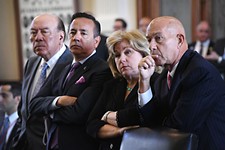On The Lege
Religious Rights
Fri., May 7, 1999
The bill, authored by Sen. David Sibley (R-Waco), is a Lone Star version of the now-abolished U.S. RFRA (say "riff-rah"), passed by Congress in 1993 and struck down by the U.S. Supreme Court in 1997, in a test case from just down the road in Boerne. The RFRA was itself an attempt to reverse a 1990 decision that held that religious institutions, and their associated projects (like schools and day care centers), were subject to local laws governing zoning, traffic management, health and safety, historic preservation (the crux of the Boerne case), and such matters.
You'd think that no-means-no when it comes from Chief Justice Rehnquist and Co., but apparently not. According to the Senate Research Council, the Supremes' decision "does not affect Texas' ability to enact similar legislation." And so Sibley's SB138 resurrects within Texas the pre-1990 legal test that a "burden of a person's free exercise of religion" -- you know, a burden like a health and safety code -- must be "the least restrictive means of furthering a compelling government interest." If not, the so-burdened can take the government in question to court.
The "free exercise of religion" can be anything, no matter how tangential, that relates to sincere religious belief, and the burden of proof rests on the defendants -- local governments -- to show both that the interest is "compelling" and the burden is the "least restrictive means." This scares the heck out of many cities and neighborhoods, such as those in Austin who've contended with projects like the Dell Jewish Community Campus and the ever-spreading Hyde Park Baptist Church. Neighborhood leaders from throughout the state, as well as local officials preaching the gospel of local control, turned out to testify against SB138 in its Senate committee hearing, but without much impact.
While the bill is currently parked in the State Affairs Committee of the more liberal House, it would be somewhat surprising if it didn't eventually find its way to the governor's desk. The ostensible marriage of religion with civil liberties has produced some unlikely coalitions; the original House companion bill, identical to Sibley's, was introduced by typically left-leaning Houston Democrat Scott Hochberg. But it seems pretty darn likely that, if passed, TRFRA will travel the same route as its federal parent, right to the courthouse steps. --M.C.M.
Family Business
As anticipated, legislation that would bar gay and lesbian couples from adopting children or serving as foster parents was left pending late Monday evening in the House State Affairs Committee, where similar bills have died quietly during past legislative sessions. Given the committee's generally lukewarm reception of the bill, the same fate seems likely for Pampa Republican Warren Chisum's HB 328, which would also allow Child Protective Services workers to interrogate prospective adopters or foster parents about their sexual orientation. That didn't stop approximately 100 witnesses from signing up to testify on the bill. Those who testified in favor of the legislation included Rebecca Bledsoe, the Dallas Child Protective Services worker who was demoted for removing a child from the foster care of a lesbian couple, and her lawyer, Roger Evans. "We don't need to place children in homes where the behavior that's modeled not only violates the laws of the state of Texas but confuses children, creates uncertainties in them, and subjects them to ridicule," Evans said.
Supporters of the legislation were far outnumbered by its opponents, however, many of them gay and lesbian parents who testified with children in tow. Among dozens who spoke against the bill was Francis Lavender, a lesbian who is attempting to adopt a child with her partner. The main problem with placing restrictions on who can and cannot adopt children, Lavender said, is that many unwanted children -- those who don't look like "Gerber babies" -- fail to be adopted and can become lifelong wards of the state. "None of these fine, upstanding heterosexual couples whom George Bush wants to be adoptive parents have stepped up to provide foster care, much less adopt" children who have developmental problems or disabilities, she said. --E.C.B.
A Bill to Die For
It's every company's dream: to pass a bill thatreduces the state's ability to regulate its business.That's just what the world's largest funeral company,Service Corporation International (SCI), has with HB 3516. Authored by Kenny Marchant, R-Coppell, the legislation could turn the Texas Funeral Service Commission into a toothless shell suitable for embalming.
The status of the TFSC has been the subject of sharp debate in recent months thanks to a nasty quarrel between SCI and the agency. Thirteen months ago, agency officials served subpoenas on several SCI funeral homes, seeking information about the company's embalming practices. In August, the commission voted to levy a fine of $445,000 against SCI for alleged violations of state embalming laws.
The agency's moves outraged SCI's dour CEO, Robert Waltrip, who said the agency's "storm trooper tactics have no place in responsible government." Waltrip, a litigious man who likes to have things his way, then began an assault on the TFSC that included siccing a private investigator on the agency's executive director, Eliza May. In February, May was forced out of her job. In March, she sued the state in a whistleblower lawsuit. She also sued Waltrip and SCI, saying their conduct "constitutes intentional infliction of emotional distress."
Marchant's bill won't affect May's lawsuit, but it could ensure that SCI won't see any more surprise subpoenas. In the past, the TFSC executive director could issue subpoenas at will. Under Marchant's bill, the TFSC board has to order the executive director to issues subpoenas, which means that any subpoenas would have to be listed as an agenda item and voted on by the commission in an open meeting.
The bill could also preclude the agency from discussing any proposed fines against a funeral operator until the fines are paid or the entity being fined waives its right to a hearing. That language was inserted by Rep. Kyle Janek, R-Houston, who said discussing the fines is "like saying the police have arrested somebody and that person has been sent to jail for 20 years when the person hasn't even been tried yet." Janek, a physician, owns between 1,000 and 5,000 shares of SCI stock, worth at least $20,000.
There are some good aspects of Marchant's bill, which is also being backed by Dallas Republican Dale Tillery. It would abolish the TFSC's nine-member board (five public members and four industry members) and replace it with a six-member board (with four public members, including the chair and vice-chair, and only two industry members). But the bill also strips the agency of its general counsel, forcing its staffers and commissioners to go to the attorney general's office on any and all legal questions. That provision infuriates one source close to the agency, who asked, "How are we going to study and apply the law?" The source said that Marchant's bill would "handcuff the board."
Sources at the Capitol say that Marchant's bill was drafted by Janis Carter, a lobbyist for the industry's trade association, the Texas Funeral Directors Association. SCI spokesman Bill Miller said he did not know the particulars of Marchant's bill, but said that whatever the funeral directors association is doing, SCI is "in lockstep with them. We are supporting the association." Marchant's bill has passed out of committee and its backers are hoping to get it onto the House floor soon. --R.B.
Got something to say on the subject? Send a letter to the editor.








